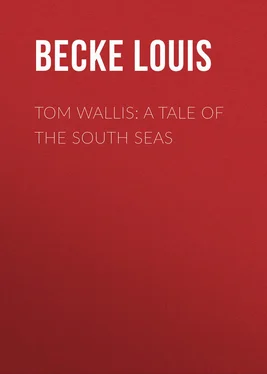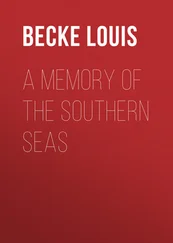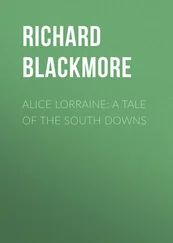Louis Becke - Tom Wallis - A Tale of the South Seas
Здесь есть возможность читать онлайн «Louis Becke - Tom Wallis - A Tale of the South Seas» — ознакомительный отрывок электронной книги совершенно бесплатно, а после прочтения отрывка купить полную версию. В некоторых случаях можно слушать аудио, скачать через торрент в формате fb2 и присутствует краткое содержание. ISBN: , Жанр: foreign_prose, foreign_antique, foreign_language, на английском языке. Описание произведения, (предисловие) а так же отзывы посетителей доступны на портале библиотеки ЛибКат.
- Название:Tom Wallis: A Tale of the South Seas
- Автор:
- Жанр:
- Год:неизвестен
- ISBN:http://www.gutenberg.org/ebooks/40705
- Рейтинг книги:4 / 5. Голосов: 1
-
Избранное:Добавить в избранное
- Отзывы:
-
Ваша оценка:
- 80
- 1
- 2
- 3
- 4
- 5
Tom Wallis: A Tale of the South Seas: краткое содержание, описание и аннотация
Предлагаем к чтению аннотацию, описание, краткое содержание или предисловие (зависит от того, что написал сам автор книги «Tom Wallis: A Tale of the South Seas»). Если вы не нашли необходимую информацию о книге — напишите в комментариях, мы постараемся отыскать её.
Tom Wallis: A Tale of the South Seas — читать онлайн ознакомительный отрывок
Ниже представлен текст книги, разбитый по страницам. Система сохранения места последней прочитанной страницы, позволяет с удобством читать онлайн бесплатно книгу «Tom Wallis: A Tale of the South Seas», без необходимости каждый раз заново искать на чём Вы остановились. Поставьте закладку, и сможете в любой момент перейти на страницу, на которой закончили чтение.
Интервал:
Закладка:
Louis Becke
Tom Wallis: A Tale of the South Seas
CHAPTER I
FATHER AND SONS
Northward from an Australian city, and hidden from seaward view by high wooded bluffs and green belts of dense wind-swept scrub, there lies one of the oldest and quaintest little seaport towns on the whole eastern sea-board, from the heat-smitten rocks of Cape York, in the far north of torrid Queensland, to where, three thousand miles to the south, the sweeping billows from the icy Antarctic leap high in air, and thunder against the grim and rugged walls of stark Cape Howe.
The house in which the Wallis family lived stood at the foot of one of these bluffs, within a stone's throw of the beach, and overlooking the bar; and at night time, when the swift outward rush of the river's current met the curling rollers from the open sea, the wild clamour and throbbing hum seemed to shake the walls of the old-fashioned building to its foundations. But to the two Wallis boys-who were born in that house-the noise of the beating surf, the hoarse shrieking notes of the myriad sea-birds, and the sough of the trade wind through the timbered slopes, were voices that they knew and understood, and were in a manner part and parcel of their own adventurous natures.
Let me try and attempt to draw, however rudely, an outline of a picture of their home, and of the sight that every morning the two lads saw from their bedroom window, before they clattered downstairs into the low-ceiled old-time dining-room, to each eat a breakfast that would have done credit to a hungry bullock-driver.
First, then, the wide, blue Pacific-would that I could see it now! – sparkling and shimmering in the yellow sunshine, unbroken in its expanse except for the great dome of Kooringa Rock, a mile from the shore, from which, when the wind blew east, came the unceasing croak and whistle of ten thousand gulls and divers, who made it their rendezvous and sleeping-place.
To the north, on the other side of the roaring, restless bar (the house was on the southern horn of the entrance to the harbour), there ran a long sweeping half-mooned beach, ten miles from point to point of headland, and backed at high-water mark by a thick fringe of low, scrubby timber, the haunt of the black wallaby, and the refuge from pursuit of mobs of wild cattle. Not a dozen people in the little township had ever been through this scrub on foot; but Tom and Jack Wallis knew and loved every foot of it, from the sandspit on the northern bank of the river to the purple loom of the furthest cape. Further back still from this narrow belt of littoral, the main coastal range rose, grey and blue in the distance, monotonous in its outlines, and its silence broken only by the axes of a few wandering parties of timber-getters, who worked on the banks of the many streams rising in the mountain gullies, whose waters joined those of the great tidal river on its way to the ocean.
Southward from the bar, the coast presented another aspect; high cliffs of black, iron-stone rock stood up steep-to from the sea, not in a continuous straight line, but in broken irregular masses, forming hundreds of small deep bays with lofty sides, and beaches of large rounded pebbles or snow-white sand. This part of the shore was so wild and desolate, that except themselves, a human being would seldom be seen about it from one year's end to the other, and the boys only went there during the crayfish season, or during an easterly gale, when from the grassy summit of one of the highest cliffs they loved to watch the maddened boil of surf far below, and catch the exhausted gulls and boobies, that sought refuge ashore from the violence of the wind amid the close-set, stunted herbage growing just beyond the reach of the flying spray. Iron-bound and grim-looking, it did not extend more than six or seven miles; and then came another long stretch of sandy beach for thrice that distance, banked up by lofty sand-dunes covered with a network of creepers, and a saline herb known as 'pig-face.'
Behind the sand-hills were a series of brackish lagoons, whose waters were covered with flocks of black swans, pelicans, and half a dozen varieties of wild duck and other waterfowl, which were seldom disturbed by any of the few settlers round about, who were too lazy to wade through water after a duck, although some of them would ride all night to steal a calf or a bullock. These lagoons had, here and there, narrow passages to the sea through the sand mounds, and where this was the case the waters were literally alive with fish-bream and whiting, and kingfish and trevally, and-but there, the memory of those happy, happy years of boyhood amid such rough and wild surroundings is strong with Tom Wallis still. For the lads, as their father sometimes said, were born in a civilized family by mistake-Nature having intended them to have black skins and woolly hair, and to hunt paddymelons and wallabies with boomerang and waddy, like the survivors of the tribe of blacks who still led a lingering existence along the shores and around the tidal lakes and inlets of that part of the country.
Of the town itself near which they lived little need be said, except that it was very quaint, and, for a new country like Australia, old-fashioned. Once, in the early days of the colony, it promised to become a thriving and prosperous place. Many retired military and civilian officers had been given very large grants of land in the vicinity of the port, upon which they had settled, and at one time many hundreds of convicts had been employed by them. Besides these, there was a large number of prisoners who toiled on the roads, or in the saw-pits, or up on the rivers felling timber, under the supervision of Government overseers. These wretched men were generally marched to their work every morning, returning to their barrack prison at night time. There had been at first a company of soldiers stationed at the port, but when it was discovered that the place was ill-chosen for a settlement-in consequence of the shifting nature of the bar-they were withdrawn to Sydney with all the prisoners, except those who were assigned to the settlers as servants or workmen. Then most of the principal settlers themselves followed, and left their houses untenanted, and their cleared lands to be overgrown, and become swallowed up by the ever-encroaching scrub, which in those humid coastal regions is more an Indian jungle than bush, as Australians understand the word 'bush.' With the soldiers went, of course, the leading civil officials, and the little seaport became semi-deserted, grass grew in the long, wide streets, and the great red-bricked barracks and Government storehouses were left to silence and decay.
Nearly twenty years after the breaking up of the settlement as a penal establishment, Lester Wallis and his young wife had settled in the place. He had formerly been in the service of the East India Company, where he had accumulated a small fortune. During a visit to Sydney, he had met and married the daughter of one of the Crown officials, an ex-naval officer, and, loth to return to the trying climate of India, decided to remain in Australia, and enter into pastoral pursuits. For a few thousand pounds he bought a small cattle-station at Port Kooringa, and, in a measure, became the mainstay of the place, for, in addition to cattle-raising, he revived the dying timber industry, and otherwise roused the remaining inhabitants of the little port out of their lethargic indifference. But fifteen years after he came to the place, and when his two boys were fourteen and thirteen years of age respectively, his wife died, after a few hours' illness. The blow was a heavy one, and for the time crushed him. He withdrew himself almost entirely from such society as the place afforded, dismissed most of his servants, and lived for more than a year in seclusion, in the lonely house facing the sea. His affection for his children, however, came to his aid, and did much to assuage his grief.
Читать дальшеИнтервал:
Закладка:
Похожие книги на «Tom Wallis: A Tale of the South Seas»
Представляем Вашему вниманию похожие книги на «Tom Wallis: A Tale of the South Seas» списком для выбора. Мы отобрали схожую по названию и смыслу литературу в надежде предоставить читателям больше вариантов отыскать новые, интересные, ещё непрочитанные произведения.
Обсуждение, отзывы о книге «Tom Wallis: A Tale of the South Seas» и просто собственные мнения читателей. Оставьте ваши комментарии, напишите, что Вы думаете о произведении, его смысле или главных героях. Укажите что конкретно понравилось, а что нет, и почему Вы так считаете.












